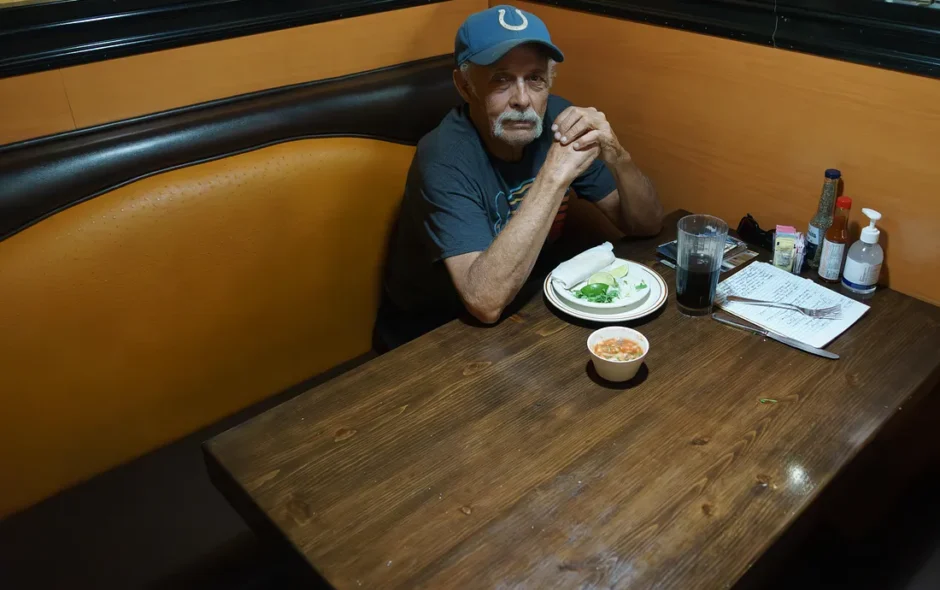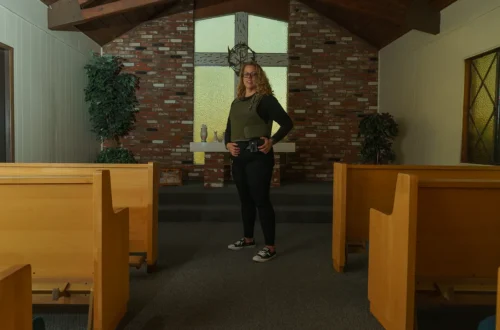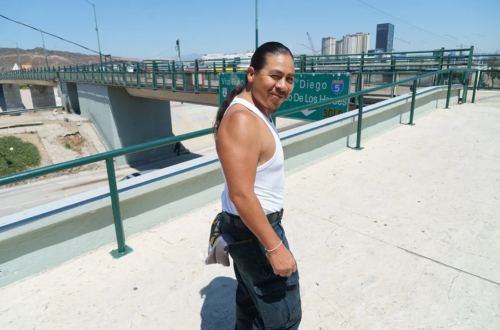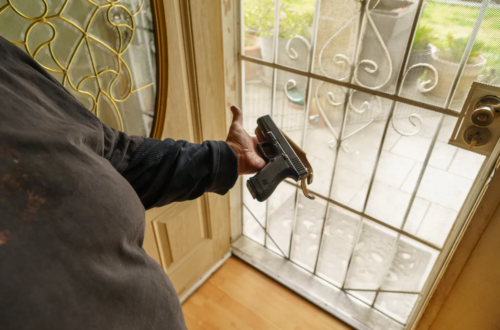Gladiator School: Stories from Inside YTS (Episode 16)
Edited and photographed by David William Reeve
Editor’s note: This is Part 16 of “Gladiator School: Stories from Inside YTS” — an oral history of life inside California’s most notorious juvenile prison. Youth Training School (known formally as Heman G. Stark Youth Correctional Facility) had a reputation for mayhem, violence and murder that earned it the name Gladiator School. It closed in 2010. Juveniles were hardened for survival at YTS, only to be returned to the streets.
Since publishing the story The Closing of California’s Most Violent Juvenile Prison, survivors of YTS have come forward to tell stories of daily life inside. This series relays and respects their stories: Juvie told by those who were there.
In this episode, Fernando Vizcarra, a rookie correctional officer, stands his ground at YTS during one of its most difficult times, as violent assaults on the staff have put control of the prison in the inmate’s hands. An imposing administrative team responds with tactical force, accused of using mafia-style tactics to regain control of the institution. New alliances form as secrets are traded as currency, resulting in the killing of a counselor.
Internal Affairs
The first time I went to YTS was in December of ’71 for an oral interview. The person conducting the interview was Ron Lopez. He asked me a couple of questions to see if I would be shocked by what he said. I wasn’t afraid of anything like violence, so he hired me.
YTS was a school to keep the White kids who could afford to get an attorney out of the county jails. You have to remember this was right after affirmative action. They let me know that I was getting a job because I was a minority — don’t forget it. It was a time when I felt that, as a minority, you had to feel cautious. YTS had a mostly White staff, ex-military, Navy, and things like that.
After the first year, my career was going really good. I was the lead man already, a Senior Youth Counselor. They started to flood YTS with Blacks and Mexicans — almost all gang-affiliated. The White kids were a mix of things: athletes, some were a little crazy, some were hardcore Nazis. The Whites had to stick together because they were becoming the minority. This started to cause a problem with some of the older White staff — who were literally scared. It reached the point where if something was going down, you knew where you would find them — hiding in the bathroom. Being 21 years old, straight out of East LA, I felt like I was a gladiator, too.

My younger brother was in the military for about two months and took leave because his girl was having a baby. He and his two friends went to a party in the area. There was some shoving that went on, and they decided just to leave. They got in their car, and he started to drive away when someone shot into the car and hit my brother in the back of the head.
I was very close to him for different reasons. My parents worked, and he was much younger than me. After he was killed, I talked to my brother’s friends, who witnessed what had happened. The person the police charged with the murder was named Chavez, a local gang member.
Chavez’s gang was harassing my brother’s friends. I started to pick them up at their house and drive them to the downtown LA courthouse. One time, Chavez’s mother came to me, and she told me in Spanish that if I knew what was good for me and the witnesses, we should leave right then and there. She was with about ten kids between the ages of 15 and 18. She felt really brave to tell me that.
To be honest with you, I wished they would have gotten physical because I was lifting weights every night, running miles and miles. I was in tip-top shape. I was going to get some revenge, but they never attacked me or anything.
It turns out one of Chavez’s younger homeboys confessed to killing my brother, and Chavez was released.
It was demoralizing to see how many staff were getting beat up and threatened at YTS. The inmates controlled the institution. They put up a sign at the entrance of the security office. It said, “# of days without a staff member being assaulted.” It would never get to a week, so they ended up removing the sign.
Wards carried a large plastic cup — their coffee cup. They called it a tumbler. They pooped in it, and urinated in it, and mixed it up. Then they put it in the microwave and boiled it. They threw it into the face of a female Youth Counselor. After that, that poor lady couldn’t work there because all the fucking wards were calling her “Shit Face.” She ended up having to leave. I don’t remember where she went to.
Like I said, I don’t think we ever went more than seven days without a staff assault.
The Mexican Mafia put a contract out on this kid, and two of the weakest wards at YTS decided they wanted to make big names for themselves, so they took up the contract.
They ended up stealing a pair of garden shears from the gardening area. They took the center bolt off the garden shears, and they each used one as a knife. When they opened the ward’s cell door, they ran in there and just started to stick him.
It was a really sad case for a couple of reasons. The kid they ended up killing had the same name as the one they wanted to kill. They killed the wrong kid.
They were little punks. What’s upsetting was that they were just a couple of young kids in the California Youth Authority trying to make a name for themselves.
One of the wards came up to me, and he told me that the Whites were planning on rat-packing the Blacks right after they came out of chow. I knew better than to give up my source, but I was also brand new on a unit at age 21. I knew I didn’t know everything.
I went up to the person in charge, who was deathly afraid of the inmates, deathly afraid. Sometimes, they’d even lock themselves in the control center. I told him, “We’re going to have a rat packing after we break the wards out of chow. The White wards are going to come out with weapons.”
“Are you sure? Are you sure? Who told you?”
“I don’t feel comfortable telling you.”
He goes, “Well, I want to make sure that it’s legit. I don’t want it to be coming from someone that’s just playing you.”
I still remember the ward’s name. His name was Mace. I said, “Mace told me.”
That stupid senior blabbermouth. He started to tell all the staff we were going to have a rat packing, so we were not going to let them out after dinner. We’re going to just lock them in. Then he says, “Mace told Fernie,” and he started telling everybody.
A day or two later, somebody threw a pitcher of hot water on this kid’s back because they found out he had told me. After that, I was taught early never to give up a kid, or anybody for that matter. They taught me a good lesson. I knew better because I came from the streets. But you also think you’re a correctional officer now. That was a lesson they taught me real early.
We got a new superintendent named Vermillion. He was a tough old guy. He took the institution back from the inmates by starting the tactical team, which, little by little, we began taking each unit back.
I was on the tac team. My partner was Gordon Fingers. Him and I got along really good, and the inmates liked us because we were fair to them. They even nicknamed us Starsky and Hutch.
One day, I was supervising the trade line, and I looked up and saw Chavez. He walked by, looked at me, and I just looked at him. I didn’t know what to do, so I just let it go. A day or two later, they called me to the Assistant Superintendent’s office.
The Assistant Superintendent says, “You know, I talked to Chavez, and he says he didn’t shoot your brother.” He had been arrested and sent to YTS on another recent violation.
I was like, “So what?”
“What are you going to do about it?”
“Well, I’m not crazy. I don’t know what you expect me to do about it.”
“Is there anything I can do for you?”
“Can you transfer him out of the institution?”
Then he turns around real quick like he already had that in mind. He says, “I can’t do that. That would deny him his visitation rights.”
At that point, I leaned backward and said, “You’re not going to have a problem from me.” I needed the job. I had three kids. That job was important to me.
For the next few months, Chavez was always walking by with a large group of guys, maybe 8 or 10, from his hood. The problem is that that was also the same hood where me and my brothers grew up, so we knew all of their older gang members. A couple of times, I said to myself, “I’m not going to start nothing, but believe me, I’m not taking nothing. I’m just not taking nothing.”
One day, as they’re walking by, one of them warns me, “Don’t forget!”
I said, “Come here. Come here.” He started walking to me and all of the inmates with him; they all started coming towards me. I go, “No, no. All of you guys keep walking.” I told my partner, “Move these guys out of here. I need to talk to this guy.”
I took him to an empty classroom.

I start to try to fight with him, but he won’t do nothing. I start pushing him hard, but he won’t do nothing. I was totally losing it. I start to give him commands:
“Take your clothes off!”
He took off all his clothes.
“Turn around and spread your cheeks!”
He was doing it. I started to perform a cavity search, or what we call a skin search. I started to yell at him that I couldn’t see.
I kept screaming out, “I can’t see nothing!” I remember he was spreading himself so much that he started trembling. As he was trembling, I put my foot in his behind, kicked him down like a frog, and told him, “Get your clothes on and get out of here.”
My partner, Fingers, knew already that we were probably going to be in for some kind of physical problem with them. We just stared at them as they walked by each day.
One of Chavez’s homeboys comes up to me and says, “Hey, Fernie, they’re going to jump you!”
I said, “Man, what’s been taking so long?”
I was waiting and waiting. Nothing ever happened.
A while later, one of the tac team duties was that once or twice a week, we would hit a unit unannounced. We did this so the staff wouldn’t warn the wards that we were coming, and we could find whatever we were looking for at the time, whether it be drugs, weapons, or whatever.
We went to the unit where Chavez was housed, and the Supervisor started assigning cells.
They assigned Chavez’s cell to me. That means Fingers and I would have had to go get Chavez, handcuff him, and have him stand there while we searched his cell. I didn’t want to do that.
I went to a staff named Picorerro, a big red-headed guy. I asked him, “Change rooms with me. I want you to search that ward’s room. I can’t go in it. I’ll explain to you later.”
We’re in the control center, and through the windows, I see this Youth Counselor named Karson, and he goes into Chavez’s cell. I go, “That’s odd. Why is he going into the cell that they just assigned us to go in and search?” I watched. He came out of the cell, and he’s got a towel in his hand, and he’s holding the towel down, trying to let it hang. I’m thinking to myself, “What’s inside the towel?”
I played it really cool. I didn’t say anything till he walked into the control center. I grabbed him by the collar, and I gave him a good yank. I grabbed his arm, and I looked; it was a 12-inch kitchen knife wrapped in the towel. I was like, “Whoa.” I backed up, and he ran away with the knife.
Karson removed a knife from Chavez’s room. I went and told my sergeant exactly what had happened.
Within a week, Chavez had been paroled. I’m at the base of the tower, and Karson walks up to me. He says, “There’s something I got to tell you.”
I go, “No, you don’t. You’re a piece of shit. Get away from me. There’s nothing you can tell me.”
“We need to talk!”
“What can you say to me after what I saw? What could you say to me?”
Karson had been protecting Chavez, watching out for him by removing the knife. He was weak; maybe he was pressured into doing it.
Then he goes, “I gave Chavez your home address,” he said remorsefully.
We notified the LAPD that this kid had my home address. I had to remove my wife and the kids and send them to her uncle’s house. Then, I had to get a weapon.
I was waiting for him every night. My neighbor across from me also knew what was going on. He had his eye out, too. We were kind of waiting on Chavez.
“You hear about Karson?” someone said to me.
“No, what happened?”
“He’s in intensive care in a burn victim’s unit.”
It comes out that Karson’s brother was sleeping with his wife. She was going to divorce him, and she and his brother were going to try to take the house. He had one of the most expensive houses at the time in Upland. Karson got drunk and torched the house and himself. A short while later, he died because of his burns.
Meanwhile, I got a call that somebody in the neighborhood had killed Chavez. I didn’t know why that would bring some relief to me, but I think it did.
After Karson told me he had given my address to Chavez, I started to put a few things together. I wanted to talk to Karson outside of the institution just to get a complete picture of why he even involved himself this way. It still bothers me that I don’t know why. If Chavez had killed me, I think it would have haunted him.
I felt like they ran YTS the way the mafia would be run. I would see stuff that would make me want to fight the administration. I had no problem snitching on an administrator. I would never snitch on a co-worker, but an administrator, as far as I was concerned, they were open season.
One of the supervisors came up to me. He was a big guy named Sergeant Wordy Walker, and he says, “I’m writing you up for leaving early on Sunday.” I tell him, “I didn’t leave early on Sunday.” He goes, “Yeah, you did. You left at noon.”
“How can I leave at noon when my post doesn’t close until 4:00? Who was there?”
“I got witnesses that told me already that you left.”
“Who are your witnesses?” Then he named out some of the staff, and I thought, “Whatever.” Then he wrote me up for leaving four hours early, which started to become serious like I was AWOL.
We went into the security office, where there three chairs around a table. I was sitting across from Wordy Walker, and Seth Martin, the Chief of Security was there.
I kept saying, “You’re wrong. You’re wrong.”
Just then, Wordy jumps up, and he puts his hands on the table, leans over to my face, and starts screaming at me how he would fuck me up. I grabbed him by his collar and jerked him on top of the table. I just pinned him down on the table, holding him there while he was trying to get away, and he can’t. I got a good hold on him.
Anybody who’s gone deep sea fishing and caught a tuna would applaud me. I had Wordy Walker, who was 200 pounds, and I got a good hold on him.
The Chief of Security grabbed my shoulders, “Let him go. Let him go!” I backed away real slow.
“Go to my office,” ordered Seth.
I went into Seth’s office and sat down. He walks in, and he’s got this funny look on his face. He smiled and said, “Forget about all of it.”
I’m like, “Cool. I’m out of here.”
I’ll never forget that because I pinned Wordy Walker down so good. I don’t think he would ever falsify something again against somebody.

They had a paint shop at YTS where they taught the inmates how to paint cars. They would take cars from the outside, and if you bought all the materials and then gave the shop a little something, they would paint your car.
I had an old ’73 Mercedes 350 SL, so I took it in there. They did a decent paint job on it for a couple of hundred dollars.

Not all wards were capable or wanted to be rehabilitated. In Snoopy’s case, I could tell from the beginning that he had an honor about him. He arrived at YTS as a little gangster. You got to remember, a lot of them would grow up in those years. They come in at 18, and by the time they’re 24, and the system has beat them down, and everybody else has beat them down, they grew up a little bit.
There was a certain amount of loyalty between Snoopy and I. He would come down and tell us things that I think we needed to know about what he heard and things like that. It was a two-way street. I tried to keep his gang from not getting involved with any other gangs. I would talk to all of them, and they could respect that because I never had any problems in front of me.
One day, the administrative office delivered ten very large cardboard containers full of sensitive files. “We need to store these behind this gate for the shredding company to pick up on Monday.” We said, “Yeah, go ahead, bring them in.” They piled them in the back.
By Friday afternoon, Snoopy would say, “Hey, do you know that Supervisor Vicarro was arrested for cock fighting?” I said, “Yeah. I heard through the grapevine a few years back.”
I’m like, “How did you know that?” He goes, “It’s in the files.”
“What files?”
“Back here, watch. They got a file on all you guys.”
“What are you talking about?” I went back there and I looked.
“Holy crap. Go through the files and pull out my file.” I said, “Any one of us that works back here, pull all our files out.”
Word of the files traveled through the grapevine; things started to filter out.

The administrative department calls us in Receiving and says, “You guys have sensitive material down there that you’re allowing everybody to look at?”
“There is material down here, but I’m not sure what’s in there.” I downplayed it.
Four of the administrators charge into the Receiving area.
“Seal that package up, seal that thing up!”
They’re using tape to seal up all the containers. They had already called someone to come and take the sensitive filed away so they could shred it. They came back, and they took all the files.
A few days later, they called me into Internal Affairs and said, “How come you let the wards see the files?” I said, “I didn’t let them. They work there. They found them. They’re the ones that brought it to my attention that there were files in there.”
They go, “Well, we think you took some of the files.” I said, “Nope, I didn’t take anything.” I said, “Do you have anyone to say I took anything?” I said, “Because if you don’t, I don’t want to hear about it.” They go, “No, we know you did.” I go, “No, I didn’t.” “Yes, you did.” “No, I didn’t.” “Yes, you did.”
This went on for about seven, eight days, two hours at a time, every day. They were taking me to Internal Affairs. They kept asking me the same thing. They thought they could break me.

It was my first year at YTS. In the lockup unit, four staff got off duty at 10 or 11:00 pm and then went to the local bar. I couldn’t tell you how long they stayed there, but probably two or three hours. They came back to YTS drunk, got their keys and went to the lockup unit. They dragged out a little Mexican kid, then proceeded to beat the shit out of him, and I guess they left. The next day, there was an investigation. All of them were fired except for one. The one guy that wasn’t fired was Chris Smith.
The administration would use Chris Smith the way a mobster would use muscle. That’s the role Chris Smith had there at YTS. They allowed him a lot of leeway for doing what he did. He had a lot of juice.
Years later, he became the program administrator of Unit one where Ineasie Baker was later killed.

Ineasie Baker and I worked together when my partner had the day off, and we took half a dozen trips working together outside the institution grounds.
She would tell me all the problems she had on unit one with that ward, James Ferris. She was trying to get him out of the institution, but that was Chris Smith’s juice ward, James Ferris. He was serving a life sentence for murder and became Chris Smith’s little snitch and doing whatever else Chris Smith probably wanted. In return, the ward had more juice than some of the staff. What would happen was people like Baker would lock him up, and then Chris Smith would say, “Let them out.”
One thing she told me that stuck in my head was that that ward, Ferris, that he was “evil,” and that’s not really a word that staff use.


Baker made it her mission that she was going to get this ward sent to men’s prison. Every which way she would try by using her pen, it didn’t work because Chris Smith was there just to either rip up the reports or just ignore them.
This went on for quite a while, and during this time, Ferris could see that he had all this juice that he could literally move around the unit and tell staff, “Hey, open this door. I got to go do this or that.” Staff wouldn’t question it. They would just open the door and let him go through because that’s the way Chris Smith had it. He allowed this kid, he gave him so much juice, and the staff were scared of Chris Smith, so most of them would just do what they were told and wouldn’t question it. He could bully people and get away with it.
I always felt that Chris Smith knew about Ineasie’s killing before anybody else — that’s for damn sure. The reason for this is because him and Ferris had some sick relationship. I would tend to say that the inmate was willing to do whatever Chris Smith wanted him to do. In return, he was going to get freedom within the institution. He could have anybody open up doors or close doors or do what he wanted. It got to that point because Chris Smith wanted it that way. All of it created the perfect storm for Ferris to be able to do what he did. I worked the units. I would never let a ward do any of that stuff without supervising him.
He even inserted himself in the investigation. After the FBI, Police Department, and some of our staff had searched the area for Ineasie Baker’s missing keys, Chris Smith walked in the room that had been checked by all these people, and he found the keys inside an Ajax Cleaner container. I think Ferris gave the keys to Chris, or he told Chris where to go find them. I would bet on that. That’s why everybody, even the FBI, thought, ‘Huh, this is weird that he would be able to find the keys after they’ve gone through the room.’
Anyway, that’s what gave Ferris the opportunity and the means to do what he did. There is no way something like that happens inside of an institution unless the person who’s running it is running some interference, I think.
Chris thought he could control him.
Right to the bitter end, Chris Smith even interfered with the investigation. The staff knew it, but you don’t want to say too much back then because you’ll get your ass fired. They’ll come after you, and there’s no way you could fight the administration. I know because half of my career was fighting them.

Fernando “Fernie” Vizcarra worked at YTS for over 29 years, from 1972–2000 before taking a medical retirement for shoulder and knee injuries that occured when breaking up fights and riots. Among his many duties, he ran the Receiving facility where young men would arrive at the institution and as a member of the tactical team. In his earlier years, he managed stress on the job by running marathons, including a race to the top of nearby Mt. Baldy.
David William Reeve is an independent writer and photographer who documents the lives of juveniles at risk. Visit davidreeve.net for more.
Contact: davidwilliamreeve (at) gmail (dot) com




